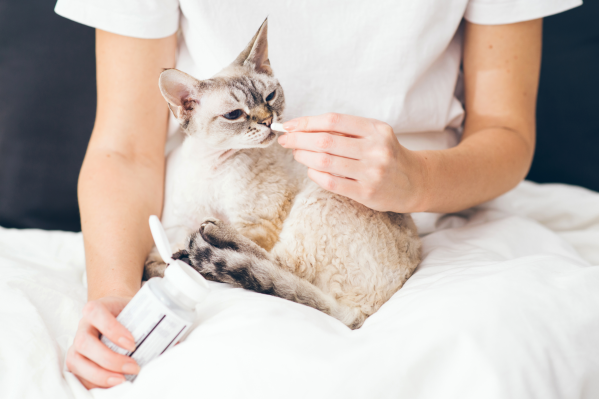Many things contribute to maintaining the happiness and health of our feline friends. Regular checkups at the veterinarian, vet-recommended cat food, exercise, mental stimulation, and more. And depending on various factors, sometimes cats need a supplement or two to maintain optimal health.
It's important to remember that before you choose a supplement for your cat, you should always consult a veterinarian to ensure that it's safe and recommended based on their health history.
While there are plenty of supplements for cats on the market, we picked these because they have shown real benefits in practice.
The best supplements for cats
Taurine
Taurine is an essential amino acid (which means cats need it to live) that's derived exclusively from animal protein (which is why cats are often referred to as "obligate predators"—they are really designed to eat meat). A deficiency of taurine is so directly associated with feline health problems that dietary taurine is used as both the treatment and the prevention of heart diseases and certain eye diseases.
The easiest way to get this right is to feed a high quality cat food from any major manufacturer, all of whom are bound to meet this requirement. Beware of smaller batch or boutique foods that might not be able to deliver this as consistently.
L-Lysine
Another essential amino acid, called L-Lysine, is thought to boost immune function and suppress some viral symptoms, particularly the upper respiratory kind (sneezing and runny eyes). It is widely available as a daily chew treat and as powders or gels that can be added to food.
Fish oil
Essential fatty acid supplements are known to promote heathy skin and joints, but in cats, it's important that these are derived from fish oil, rather than plant products. Plus, cats tend to like the fish flavor!
Prebiotics and probiotics
Animals need the right bacteria to help digest the food that they eat, and an adequate amount of fiber to help move things along. Healthy bacteria are called "probiotics". Many humans depend on probiotics, often from yogurt sources, to stay “regular.” (Fun fact: You should use probiotics made specifically for pets, which will have a lactobacillus-species of bacteria that grows better in animals than any human yogurt source, and without all the sugar and dairy). There is evidence that proper bacterial balance helps with mood as well as GI health, helping to avoid diarrhea, including the disruptions related to antibiotic therapy and stress.
Fiber supplements are called "prebiotics" because they must be there before, sort of to provide a “reef” for the healthy bacteria to grow on, like living coral does on the framework of that reef. Many cat foods contain fiber, with foods designed for seniors and overweight cats generally having higher levels. You can add fiber to any diet with pumpkin or a sprinkle of dry fiber supplement (like Metamucil).
Glucosamine
Glucosamine chondroitin is an oral supplement that delivers the building blocks of heathy joints, helping to maintain healthy cartilage and lubrication. Once primarily marketed to dogs, there are now many forms, including chews or powders, that are attractive to cats. This is because of a greater recognition of arthritic symptoms in our older cats, as much as they might try to hide that from us. There is also evidence that glucosamine helps reduce stress-related bladder inflammation.
Urinary acidifiers
Speaking of urinary inflammation…urinary crystal formation and stress-related bladder inflammation can be a problem in about 10% of all cats. In female cats, this will cause symptoms that mimic a urinary tract infection, but in male cats can lead to a dangerous urinary obstruction. Cats with a significant problem are often required to eat a prescription food that makes their urine pH acidic (below 7) as a prevention, but there are reliable OTC food options in this area. These diets can be found in the pet supply or grocery store, and will be specifically labeled as such (with phrases like “for urinary health.”) And while they make cranberry supplements meant to acidify urine for cats, I’ve never found one that a cat would eat.
Pheromone diffusers
Anxiety is inappropriate fear. One way to explain it—if you’re under threat, you should feel afraid. If you are not under threat and you feel afraid anyway, that’s anxiety. It often doesn’t make sense. Cats can display anxiety in a number of ways—they will pee and poop in places they seem to pick deliberately to annoy you, they will fight with each other, or they can get an OCD-like behavior that causes them to over-groom their bellies bald in a very distinctive triangle pattern. This stress can lead to more frequent vomiting and diarrhea, too, by causing excess stomach acid.
Pheromones are chemicals that animals produce that influence behavior. You know how a happy cat rubs it face on things, like you? In addition to being affectionate, that cat is also instinctively smearing its own facial pheromone on the thing to say “this makes me happy”. Pheromone diffusers, like the ones marketed by Fel-i-way, are like air fresheners that emit a synthetic version of this "pheromone feline of well-being". You won’t smell anything, it’s not an oral medication you have to chase them around to give, and it can be surprisingly effective at curbing stress.
Supplements can be a great addition to your cat's diet, and a vet can help you understand which ones your cat needs. If you have any questions about the best supplements for cats, the team at Pawp is here 24/7.
